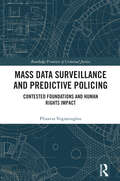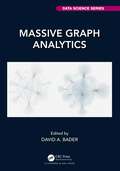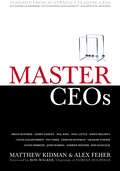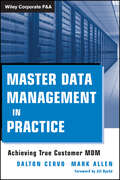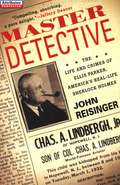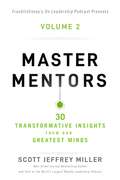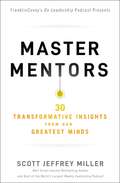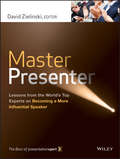- Table View
- List View
Mass Tourism in a Small World
by Jim Butcher John Heeley Martin Farr Heather Jeffrey Gabriele Manella Raoul Bianchi Erik Cohen Dr Hazel Andrews Julio Aramberri Dr Gregory Ashworth Sue Bleasdale Professor Kelly Bricker David Duvall Professor Andrew Holden Dr Stanislav Ivanov Professor Chris Ryan Asterio Savelli Hongdi Shen Dr John E Tunbridge Professor David Weaver Dr Paul F WilkinsonThis book reviews all aspects of the phenomenon of mass tourism. It covers theoretical perspectives (including political economy, ethics, sustainability and environmentalism), the historical context, and the current challenges to domestic, intra-regional and international mass tourism. As tourism and tourist numbers continue to grow around the world, it becomes increasingly important that this subject is studied in depth and best practice applied in real-life situations. This book: - Is the first to address a range of theoretical issues relating to mass tourism; - Uses a wide selection of case studies to translate theory into practice, covering the historical rise and fall of UK seaside resorts, the increase in Chinese tourism, conflict between different mass tourism groups, destination transformation from mass to niche tourism, and specific problems facing cruise ships; - Is written by a range of international, established authors to give a global perspective on the subject. Finishing with a speculative chapter identifying potential future trends and challenges, this book forms an essential resource for all researchers and students within tourism studies.
Mass data surveillance and predictive policing: Contested Foundations and Human Rights Impact (Routledge Frontiers of Criminal Justice)
by Plixavra VogiatzoglouThis book critically assesses legal frameworks involving the bulk processing of personal data, initially collected by the private sector, to predict and prevent crime through advanced profiling technologies. In the European Union (EU), mass data surveillance currently engages three sectors: electronic communications (under the e-Privacy Directive), air travelling (under the Passenger Name Records Directive), and finance (under the Anti-Money Laundering Directive), and increasingly intersects with the deployment of predictive policing techniques. The book questions the legitimacy and impact of these frameworks in light of the EU’s powers to provide security while safeguarding fundamental rights, particularly privacy, data protection, e-ective remedy, fair trial, and presumption of innocence.Focusing on the security shift towards forestalling crime before it occurs, the book identifies its distinct characteristics, such as the blurred lines between the public and private sector actors, and interrogates whether the legal bases and traditional theories on security can account for it. The book further explores the challenges these pre-crime practices pose, including their questionable e-ectiveness and the ambiguous application of human rights safeguards in situations where no crime has been committed, yet individuals face consequences as a result of deploying predictive analytics on mass amounts of commercially collected personal data. In examining the interference with several fundamental rights, the book also highlights aspects neglected by the jurisprudence of the Court of Justice of the European Union and the European Court of Human Rights, such as the expansive nature and the collective and cumulative e-ects of these frameworks.
MassChallenge
by Tarun Khanna Andy Wu Rembrand Koning Nataliya Langburd WrightThe case explores the strategic decision of global non-profit startup accelerator MassChallenge on whether to pursue a for-profit spinoff, discussing: (1) the costs and benefits of this decision, (2) how best to manage the risks of the decision, and (3) alternative pathways to ensure business sustainability and success.
Massachusetts Cranberry Culture: A History from Bog to Table (American Palate Ser.)
by Robert S. Cox Jacob WalkerThis historical look at New England&’s favorite fruit &“ends up capturing the essence of the time period and place&”—from the authors of A History of Chowder (Edible South Shore). New Englanders know that cranberries are not for holidays alone. For centuries, this tart fruit—a staple in the Yankee diet since before it was domesticated—has reigned over the cranberry heartland of Barnstable and Plymouth Counties, Massachusetts. Dozens of recipes that utilize the &“humble fruit&” have risen up over the years, the most popular being cranberry sauce, which one imaginative New Englander paired with lobster. The popularity of the berry exploded in the 1840s, and despite occasional setbacks such as the great pesticide scare of 1959, demand continues to rise to this day. Authors Robert S. Cox and Jacob Walker trace the evolution of cranberry culture in the Bay State, exploring the delectable history of this quintessential New England industry. Includes photos!
Massachusetts Financial Services
by Brian J. Hall Jonathan P. LimThis case describes the compensation and performance evaluations at an investment management company. The senior management team of Massachusetts Financial Services (MFS) Investment Management was contemplating an introduction of hedge funds at the firm, but many believed that typical hedge fund manager pay (20% of the upside) would harm the MFS culture, which glorified "star performance but not star egos." The case presents the MFS compensation philosophy and plan (including the plan's emphasis on subjective compensation), the types of people it attracted, the resulting culture, and how the senior management team approached the hedge funds question. It includes side discussion on firm-specific human capital.
Massachusetts General Hospital and the Enbrel Royalty
by David S. Scharfstein Darren R. SmartMassachusetts General Hospital is considering selling its royalty interest in Enbrel, Amgen's blockbuster drug for the treatment of rheumatoid arthritis. In assessing whether to sell, and at what price, the hospital must determine its value to a potential buyer as well as its own value of the royalty income.
Massachusetts General Hospital: CABG Surgery (A)
by James Weber Steven C. WheelwrightA cross-functional team at Massachusetts General Hospital tries to reengineer the service delivery process (the "care path") for heart bypass surgery (CABG) in order to shorten hospital stays (and lower costs) while maintaining/enhancing the quality of care provided.
Massachusetts Lottery
by N. Craig Smith John A. Quelch Ron LeeDescribes the role of state lotteries, lottery marketing, and the operation of the Massachusetts State Lottery, including reference to Massachusetts lottery advertising. Highlights the success of state lotteries while also noting growing criticism, particularly of their advertising. Teaching objectives: To consider 1) truth in advertising, 2) the ethics of marketing gambling, and 3) the marketing/public policy interface.
Massachusetts Pay-for-Success Contracts: Reducing Juvenile and Young Adult Recidivism
by V. Kasturi Rangan Lisa A. ChaseThe case describes the nature of juvenile recidivism in Massachusetts and explores the potential structure of a privately funded, publicly guaranteed pay-for-success contract.
Massey-Ferguson Ltd.--1980
by Carliss Y. Baldwin Scott P. Mason Jennifer H. HughesMassey Ferguson began fiscal year 1981 in default on $2.5 billion of outstanding debt. The company's future depends on the ability of lenders, the governments of Canada and Ontario, and management, to agree on a refinancing plan. The case reviews Massey's performance and position in the industry and raises questions about the company's ability to compete in the long run. Provides information on the firm's claimants in order to focus students on the issues of a refinancing.
Massive Graph Analytics (Chapman & Hall/CRC Data Science Series)
by David A. BaderExpertise in massive scale graph analytics is key for solving real-world grand challenges from health to sustainability to detecting insider threats, cyber defense, and more. Massive Graph Analytics provides a comprehensive introduction to massive graph analytics, featuring contributions from thought leaders across academia, industry, and government. The book will be beneficial to students, researchers and practitioners, in academia, national laboratories, and industry, who wish to learn about the state-of-the-art algorithms, models, frameworks, and software in massive scale graph analytics.
Massive Inc. (A)
by Joseph B. Lassiter Victoria W. Winston Clark GilbertHow do you go to market with a brand new product in a new industry? How does a business develop an opportunity and then adapt its strategy to ensure success? Who are the early adopters and how does a business work with them? Katherine Hays, chief operating office at Massive Inc., faced several options for guiding the development and launch of the Massive Ad Network. Massive had recognized that young males, ages 18 to 34, were becoming increasingly hard to reach through traditional means of advertising yet, at the same time, video game usage by this highly coveted market segment had skyrocketed and online game advertising provided a valuable revenue opportunity. To capitalize on the situation, Massive had built a product that enabled the dynamic delivery of advertising content into video games. Although the concept was simple, successful adoption of the new advertising medium required the enthusiastic buy-in from three distinct audiences: game publishers and developers, advertisers and their media buyer, and gamers. To be successful, Massive needed to continue to ask questions, experiment, and listen to each of these constituencies.
Massport (A): The Aftermath of 9/11
by Michael A. Roberto Erika M. FerlinsThis case looks at the turnaround at the Massachusetts Port Authority after the 9/11 terrorist attacks. It begins with the situation during the immediate aftermath of 9/11 and then describes how the new CEO restructures the public agency to operate much more like a business organization.
Master CEOs
by Matthew Kidman Alex FeherFilled with insights from leading Australian CEOs, Master CEOs taps into the thoughts of Australia's leading chief executive officers or managing directors in an effort to understand why they are such outstanding leaders, and why the companies they run have delivered above-average results. Master CEOs is not only about management - it also delivers a very strong message on leadership. To be interviewed for the book, the CEO had to be in charge of their company for at least 10 years and delivered shareholders a return greater than the share market in that period. CEOs covered include: Gerry Harvey from Harvey Norman, Paul Little from Toll Holdings, Graham Turner from Flight Centre, David Simmons from Hills Industries and many more. All new interviews, never before published.
Master Data Management in Practice: Achieving True Customer MDM (Wiley Corporate F&A #559)
by Mark Allen Dalton CervoIn this book, authors Dalton Cervo and Mark Allen show you how to implement Master Data Management (MDM) within your business model to create a more quality controlled approach. Focusing on techniques that can improve data quality management, lower data maintenance costs, reduce corporate and compliance risks, and drive increased efficiency in customer data management practices, the book will guide you in successfully managing and maintaining your customer master data. You'll find the expert guidance you need, complete with tables, graphs, and charts, in planning, implementing, and managing MDM.
Master Detective: The Life and Crimes of Ellis Parker, America's Real-Life Sherlock Holmes
by John Reisinger"Fascinating reading for true-crime buffs and mystery fans alike. " --Max Allan Collins Known as the greatest detective in the world, Ellis Parker was the "American Sherlock Holmes" who solved ninety-eight percent of the murders he pursued. Yet his illustrious forty-year career ended tragically in prison, where he died on the very eve of certain Presidential pardon. Here is a riveting account of the ultimate sleuth, a man who solved his first crime as a teen by nabbing the thief who stole his father's horse and buggy. Drawing on the emerging discipline of psychology and his uncanny deductive skills, Parker was a "profiler" long before the term existed, and often apprehended criminals without ever leaving his desk! Then came the kidnapping of Charles Lindbergh's baby son in 1932. From that moment things began to go wrong--terribly wrong--as Parker pushed himself past the bounds of law in pursuit of the truth. A fascinating look at America in the early years of a tumultuous century, Master Detective paints a long-overdue portrait of an exceptionally talented and driven man who, in the end, stopped at nothing in his quest for justice. "A riveting read. In Reisinger, America's real-life Sherlock Holmes has found his Watson. "--John Lutz
Master Examinations, 27th edition
by Inc. Real Estate TrainersThis is a compilation of questions and answers on real estate.
Master Guide for Photographing High School Seniors
by Dave WackerIn this instructive resource, seasoned photographers illustrate how to become an elite senior-portrait photographer. Whether the student wants a simple headshot for the yearbook, classic studio portraits, or fashion-oriented images shot on location, this resource outlines every phase of the process#151;from selecting the right equipment, poses, and light to generating great expressions and using the computer to retouch the face. An emphasis to stay ahead of the competition in terms of style, technology, customer service, and advertising offers photographers no-nonsense ideas for shooting better images and providing more variety within the often very limited time constraints of a senior-portrait session. Packed with before-and-after images, sequential illustrations that show posing variations, sample marketing materials, and much more, this is a must have book for those entering the market#151;or those seeking to chisel out a bigger share.
Master Limited Partnerships: Ertragreiche, wachsende Erdöl-Anlagen für einen gesicherten, sorgenfreien und komfortablen Ruhestand
by Richard StookerIch habe dieses Buch geschrieben, weil es sonst niemand getan hat. Sie können Bücher über Real Estate Investment Trusts (REITs), kanadische Einkommensfonds, gewöhnliche dividendenzahlende Aktien, Anleihen und Versorgungsaktien kaufen. Sie können Bücher kaufen, die ein Kapitel oder einen Anhang über Master Limited Partnerships enthalten. Aber - bis jetzt - konnte man kein Buch kaufen, das sich ausschließlich mit Master Limited Partnerships beschäftigt. Das ist der Zweck des restlichen Teils dieses Buches - Master Limited Partnerships im Detail zu erklären, damit Sie die technischen, rechtlichen und praktischen Gründe verstehen, warum sie so großartige Investitionen sind.
Master Mentors Volume 2: 30 Transformative Insights from Our Greatest Minds
by Scott Jeffrey MillerExperience a quantum leap in your personal mindset and career toolset through 30 transformative insights from Our world&’s greatest minds.Mining the best and brightest revelations from FranklinCovey&’s global podcast, On Leadership With Scott Miller, Scott personally introduces you to 30 Master Mentors, featuring the single most transformative insight from each of them.Depending on where you are in your journey, Master Mentors will:Challenge your current mindset and beliefs, leading to what could be the most important career and thoughtprocess shifts of your life!Restore you to the mindset and beliefs you find effective but aren&’t currently living in alignment with.Validate that you are on the right path with your current mindset and beliefs and empower you on your way forward.Whether you are challenged, affirmed, informed, or inspired—Master Mentors guarantees you will Experience a transformative shift in your personal mindset, life skillset, and career toolset.
Master Mentors: 30 Transformative Insights from Our Greatest Minds
by Scott Jeffrey MillerFor busy professionals and lifelong learners seeking practical strategies for reaching new heights, Master Mentors distills 30 essential learnings from Seth Godin, Susan Cain, Trent Shelton, General Stanley McChrystal, and other top business minds and thought leaders of our time.Mining the best and brightest revelations from FranklinCovey&’s global podcast, On Leadership with Scott Miller, Scott personally introduces you to 30 Master Mentors, featuring the single most transformative insight from each of them.Depending on where you are in your journey, Master Mentors will:Challenge your current mindset and beliefs, leading to what could be the most important career and thought- process shifts of your life!Restore you to the mindset and beliefs you find effective but aren&’t currently living in alignment with.Validate that you are on the right path with your current mindset and beliefs and empower you on your way forward.Whether you are challenged, affirmed, informed, or inspired—Master Mentors guarantees you will experience a transformative shift in your personal mindset, life skillset, and career toolset.
Master Posing Guide for Wedding Photographers
by Bill HurterOutlining a theory that combines the refinement of traditional posing techniques with the more organic, spontaneous techniques of photojournalism, this creative and informative resource offers poses that rely on personality and interaction. These instructions from a veteran wedding photographer provide the skills needed to recognize what makes a great pose and how to subtly direct your clients to achieve the needed balance between looking great and looking comfortable. Ultimately, this grouping of modern and traditional shots offers answers to the complications faced when attempting to pose wedding parties quickly while keeping the natural look that all wedding couples desire.
Master Presenter: Lessons from the World's Top Experts on Becoming a More Influential Speaker
by David ZielinskiFor anyone who wants to become a more persuasive and tech-savvy presenter, Master Presenter offers an accessible collection of the best tips, tactics, and hard-won lessons from top presentation skill coaches who write for PresentationXpert newsletter. Designed to be a hands-on resource, the book includes advice drawn from real-world, time-starved businesspeople who create compelling presentations that get results. Now, you too can tap into the power of the little-used, but valuable features of PowerPoint® that can save time or enhance slide design and make your presentation stand out in a crowd. This groundbreaking book also includes practical advice on getting the most from mobile devices to enhance presentations and shows how to apply social media tools like Twitter to aid in delivering compelling messages. Learn how web conferencing can be used not only to reduce travel costs, but to deliver more effective informational, training or motivational presentations across time zones. In addition to putting the spotlight on the high-tech, Master Presenter contains valuable information on the critical low-tech presentation skills. Contributors show how to best use your voice, hands, and body and what it takes to move your listeners to take action when making a well-prepared pitch. And even if you are inexperienced, you can use the book's techniques to become a great storyteller that will win over audiences and help earn you a reputation as a master presenter. Praise for Master Presenter "Master Presenter arms you with the method and magic to present with poise and power. David Zielinski has assembled the best and brightest mentors to teach greatness in business presenting." —Chip R. Bell, author of Managers as Mentors "Master Presenter is the most comprehensive collection of useful articles I've ever seen in one place. After reading more than 200 books on public speaking in my lifetime and teaching the subject in eight countries, I can easily recommend this book for beginners and seasoned speakers. Great tips on PowerPoint®, for example, with dozens of articles and illustrations on all aspects of speaking by leaders in the field." —Michael Buschmohle, president, Applause Associates "As a 30-year veteran of presenting and a certified professional facilitator, I found myself reading through this book's articles and still gaining new insights into things I can do to improve my presentations. I was impressed by the perspectives shared by this top-notch team of experts. This is one of the few books I would strongly recommend to my network of customers, who are purchasers of facilitation and engagement tools." —Dr. Scott Simmerman, managing partner, Performance Management Company "I make presentations for a living and I've been doing it for a long time, but I'm keeping a copy of this book within reach on my desk at all times. I could have used it when I was starting out, but I also have learned enough over the years to recognize how valuable this book will be as an ongoing and wide-ranging resource for telling compelling stories." —Brian McDermott, co-author of Leading Innovation and Time Out for Leaders
Master Scheduling
by John F. ProudMaster scheduling is an essential planning tool that helps manufacturers synchronize their production cycle with actual market demand. The third edition of this easy-to-follow handbook helps you understand the basic and more advanced concepts of master scheduling, from implementation to capacity planning to final assembly techniques. Packed with handy checklists and examples, Master Scheduling, Third Edition delivers guidelines and techniques for a world-class master schedule.
Master Smart Strategic Experiments: Don't Abandon Innovation in Tough Times
by Scott D. AnthonyThe popular perception that innovation is risky and expensive presents challenges in uncertain times. That perception makes it far too easy for naysayers to justify curtailing innovation investments. Constant change requires companies to develop more ideas more quickly and cheaply, and with lower risk. This chapter describes how the proper management of strategic experiments can help companies achieve these objectives. This chapter was originally published as chapter 5 "The Silver Lining: An Innovation Playbook for Uncertain Times."

